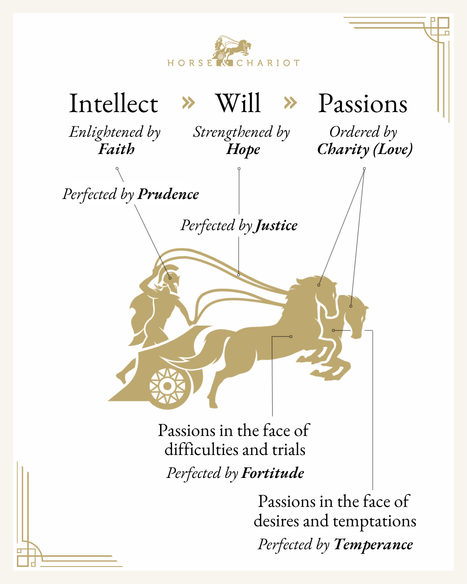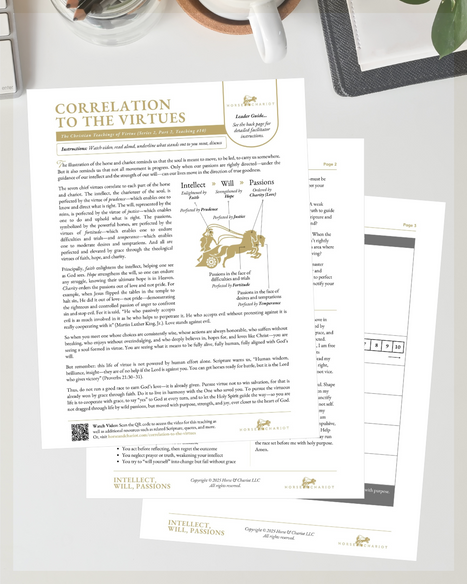All Series > Well-Ordered Soul > Part 2
Correlation to the Virtues
(Series 2, Part 2, Teaching #10)
Watch: On YouTube
Correlation to the Virtues
The illustration of the horse and chariot reminds us that the soul is meant to move, to be led, to carry us somewhere. But it also reminds us that not all movement is progress. Only when our passions are rightly directed—under the guidance of our intellect and the strength of our will—can our lives move in the direction of true goodness.
The seven chief virtues correlate to each part of the horse and chariot. The intellect, the charioteer of the soul, is perfected by the virtue of prudence—which enables one to know and direct what is right. The will, represented by the reins, is perfected by the virtue of justice—which enables one to do and uphold what is right. The passions, symbolized by the powerful horses, are perfected by the virtues of fortitude—which enables one to endure difficulties and trials—and temperance—which enables one to moderate desires and temptations. And all are perfected and elevated by grace through the theological virtues of faith, hope, and charity.
Principally, faith enlightens the intellect, helping one see as God sees. Hope strengthens the will, so one can endure any struggle, knowing their ultimate hope is in Heaven. Charity orders the passions out of love and not pride. For example, when Jesus flipped the tables in the temple to halt sin, He did it out of love—not pride—demonstrating the righteous and controlled passion of anger to confront sin and stop evil. For it is said, “He who passively accepts evil is as much involved in it as he who helps to perpetrate it. He who accepts evil without protesting against it is really cooperating with it” (Martin Luther King, Jr.). Love stands against evil.
So when you meet one whose choices are consistently wise, whose actions are always honorable, who suffers without breaking, who enjoys without overindulging, and who deeply believes in, hopes for, and loves like Christ—you are seeing a soul formed in virtue. You are seeing what it means to be fully alive, fully human, fully aligned with God’s will.
But remember: this life of virtue is not powered by human effort alone. Scripture warns us, “Human wisdom, brilliance, insight—they are of no help if the Lord is against you. You can get horses ready for battle, but it is the Lord who gives victory” (Proverbs 21:30–31).
Thus, do not run a good race to earn God’s love—it is already given. Pursue virtue not to win salvation, for that is already won by grace through faith. Do it to live in harmony with the One who saved you. To pursue the virtuous life is to cooperate with grace, to say “yes” to God at every turn, and to let the Holy Spirit guide the way—so you are not dragged through life by wild passions, but moved with purpose, strength, and joy, ever closer to the heart of God.

Scroll down for the lesson plan and other related resources associated with this teaching.
Copyright © 2025 Horse & Chariot. All rights reserved.
New teachings like this are released often. Subscribe free and never miss a teaching!
Resources

Visual Resource
Illustration of the horse and chariot and how it correlates to the seven chief virtues.

Free Lesson Plan
Perfect for small groups, families, classrooms, or personal reflection.

5-Minute Deep Dive
Deepen your understanding of this source teaching by listening to a brief podcast-style discussion (powered by Google Gemini).
Related Scripture
“Human wisdom, brilliance, insight—they are of no help if the Lord is against you. You can get horses ready for battle, but it is the Lord who gives victory.” — Proverbs 21:30‑31 (GNT)
“And if anyone loves righteousness, her labors are virtues, for she teaches self-control and prudence, justice and courage; nothing in life is more profitable for mortals than these [prudence, justice, fortitude, and temperance].” — Wisdom 8:7 (NRSVue)
“Happy the one who finds wisdom, the one who gains understanding!” — Proverbs 3:13 (NABRE)
“For this very reason, make every effort to supplement your faith with virtue, virtue with knowledge.“ — 2 Peter 1:5 (NABRE)
“This God is my strong refuge; he makes my pathway safe.” — 2 Samuel 22:33 (GNT)
“Is not your fear of God your confidence, and the integrity of your ways your hope?” — Job 4:6 (NRSVue)
“For the Spirit that God has given us does not make us timid; instead, his Spirit fills us with power, love, and self‑control.” — 2 Timothy 1:7 (GNT)
“The spirit of the Lord shall rest on him, the spirit of wisdom and understanding, the spirit of counsel and might, the spirit of knowledge and the fear of the Lord.” — Isaiah 11:2 (NRSVue)
“O give thanks to the Lord, for he is good; his steadfast love endures forever!” — Psalm 118:1 (NRSVue)
Related Quotes
“He who passively accepts evil is as much involved in it as he who helps to perpetrate it. He who accepts evil without protesting against it is really cooperating with it.” — Martin Luther King, Jr.
“Someone can be passionate about food in a good way. However, if someone’s desire for food becomes irrational—that is—he begins to eat more than his body needs, bad things happen. Gluttony. Heartburn. Lack of sleep. Weight gain. Obesity. Most people who eat too much know eating so many calories is not healthy, yet their passions overrun their intellects whenever the dessert cart rolls up to the table. In order to resist that dessert cart, one has to begin patterns of behavior. The ethical theory of Thomas Aquinas is based on these patterns of behavior. Good patterns are called virtues. Bad patterns are called vice. Thomas Aquinas, then, proposes for us an ethics of virtue.” — Dr. Taylor Marshall
“Perfect wisdom has four parts: Wisdom, the principle of doing things aright. Justice, the principle of doing things equally in public and private. Fortitude, the principle of not fleeing danger, but meeting it. Temperance, the principle of subduing desires and living moderately.” — Plato
“If any man should conceive certain things as being really good, such as prudence, temperance, justice, fortitude, he would not after having first conceived these endure to listen to anything which should not be in harmony with what is really good.” — Marcus Aurelius
“Temperance is simply a disposition of the mind which binds the passion.” — St. Thomas Aquinas
“We set forth our petitions before God, not in order to make known to Him our needs and desires, but rather so that we ourselves may realize that in these things it is necessary to turn to God for help.” — St. Thomas Aquinas

Never miss a teaching — get all new teachings of virtue sent to your inbox free!
